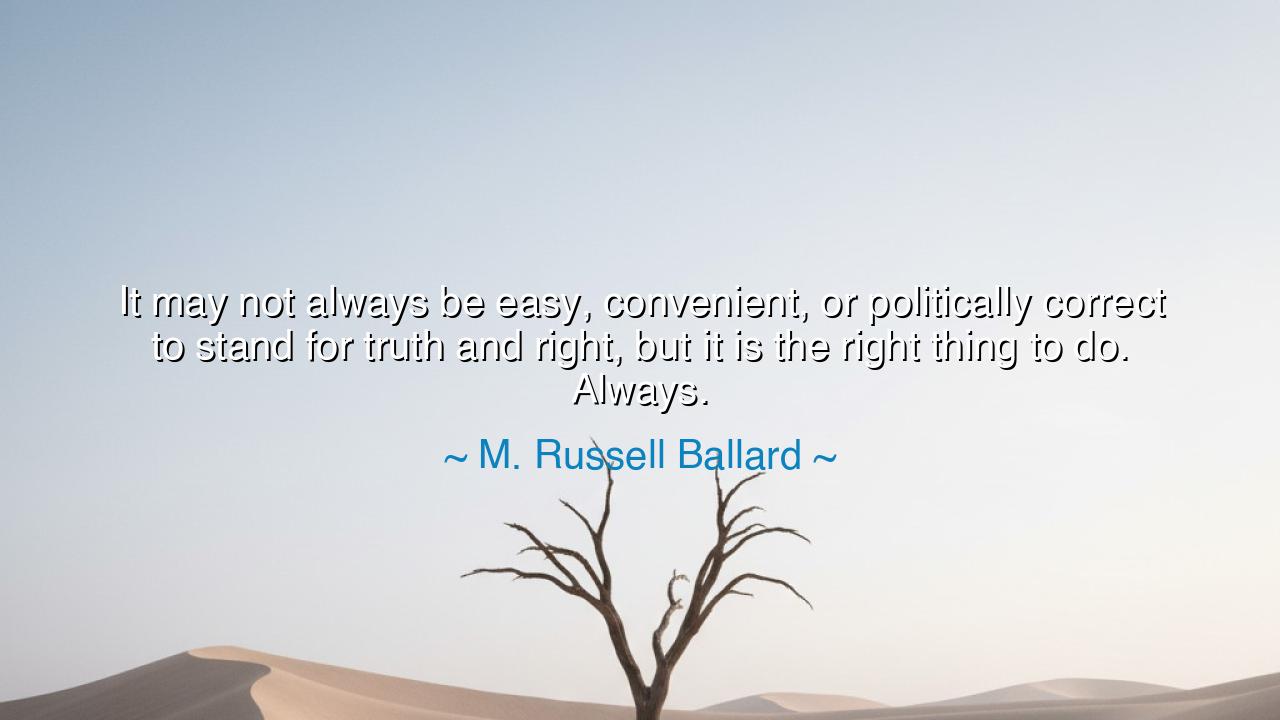
It may not always be easy, convenient, or politically correct to
It may not always be easy, convenient, or politically correct to stand for truth and right, but it is the right thing to do. Always.






Hear the solemn wisdom of M. Russell Ballard, whose words strike with the force of a prophet’s cry: “It may not always be easy, convenient, or politically correct to stand for truth and right, but it is the right thing to do. Always.” These are not words of comfort, but of courage. They remind us that the path of truth and right is often steep, shadowed, and lonely. Yet though the world may scorn or punish those who walk it, it is the only path that leads to honor, peace, and eternal strength.
The ancients taught that virtue shines brightest when darkness surrounds it. To act righteously when praised is no great feat, but to uphold truth when mocked, threatened, or abandoned—that is the measure of greatness. For there are always easier roads: the road of silence, the road of compromise, the road of cowardice. Yet these roads, though smooth at first, lead to ruin. Only the narrow and difficult road of right leads to the summit where the soul may breathe freely.
Consider the story of Martin Luther King Jr. In his day, to rise against segregation and hatred was not convenient, not safe, not politically welcomed by those in power. Yet he stood unwavering for truth—that all men are created equal—and for right—that justice must flow down like waters. He was jailed, despised, and finally slain, but his voice became a trumpet heard across the world. Because he stood when it was hardest to stand, generations now walk freer. His life is proof that the eternal command is not to win comfort, but to live by truth, always.
And look further back to the trial of Socrates. Offered the chance to flee, to compromise, to escape death, he chose instead to drink the cup of hemlock. For him, to betray truth was worse than death. He taught his disciples that it is better to suffer wrong than to commit it, for the soul wounded by injustice done is far sicker than the body wounded by injustice suffered. His courage still echoes across millennia, showing us that truth is not bound by time, nor is right silenced by executioners.
Thus we see: the price of standing for truth may be high, but the cost of abandoning it is far greater. To betray right for convenience is to sell one’s soul for a fleeting comfort. The man who bends with every wind of opinion will be forgotten; the one who stands like a pillar, even against the storm, becomes a beacon for generations to come. Truth is not subject to fashion, and right does not shift with the tides of men’s applause.
What lesson, then, must we carry into our lives? It is this: when the moment of testing comes—and it will—choose truth over convenience, right over comfort. Speak with honesty even if your voice trembles. Defend the vulnerable even if you stand alone. Refuse the easy silence that betrays justice. In small choices each day, strengthen your soul, so that when the great trial arrives, you are already unshakable.
Let your life be a testimony carved in action, not just in words. Teach your children that truth is not negotiable, that right is not optional. And remind yourself, when the weight of compromise presses upon you, of this eternal command: it is not always easy, not always convenient, not always popular—but it is always right. And in the end, those who stand firm will stand forever, while those who bow to falsehood will vanish like smoke in the wind.






HGHuong Giang
This quote brings to light the tension between doing what’s right and the pressures of society. We often face situations where telling the truth or doing the right thing isn’t convenient, but I think this is where real character is tested. I wonder, though, if doing what’s right also requires wisdom—knowing when and how to speak up. Does standing for truth always have to be public and confrontational, or can it sometimes be more subtle and personal?
DDDan Dan
The idea that standing for truth isn’t always easy or convenient really resonates with me. In today’s world, where everyone seems to have a different version of truth, how do we know when to take a stand? What if standing up for truth means alienating people we care about or facing backlash? I think it’s easy to say that we should always do what’s right, but when it feels like the consequences are high, how do we stay true to that commitment?
VHvan huan
I completely agree with this quote, but I also wonder if there’s a balance between standing for truth and considering the consequences. When doing the right thing isn't politically correct, can it ever have negative outcomes? It seems like sometimes standing up for what’s right may put us in difficult situations, but if we know it's the truth, does that mean it’s always worth it? I think this can be especially challenging in today's polarized world.
THDo Thi Thu Ha
This quote makes me think about how difficult it can be to always do what's right, especially when it's not the popular or easy choice. But I also feel like it’s a reminder that truth and integrity should always come first. Is it worth standing for what’s right even if it means facing opposition? I think sometimes we need the courage to act on our convictions, even when it’s uncomfortable or unpopular.